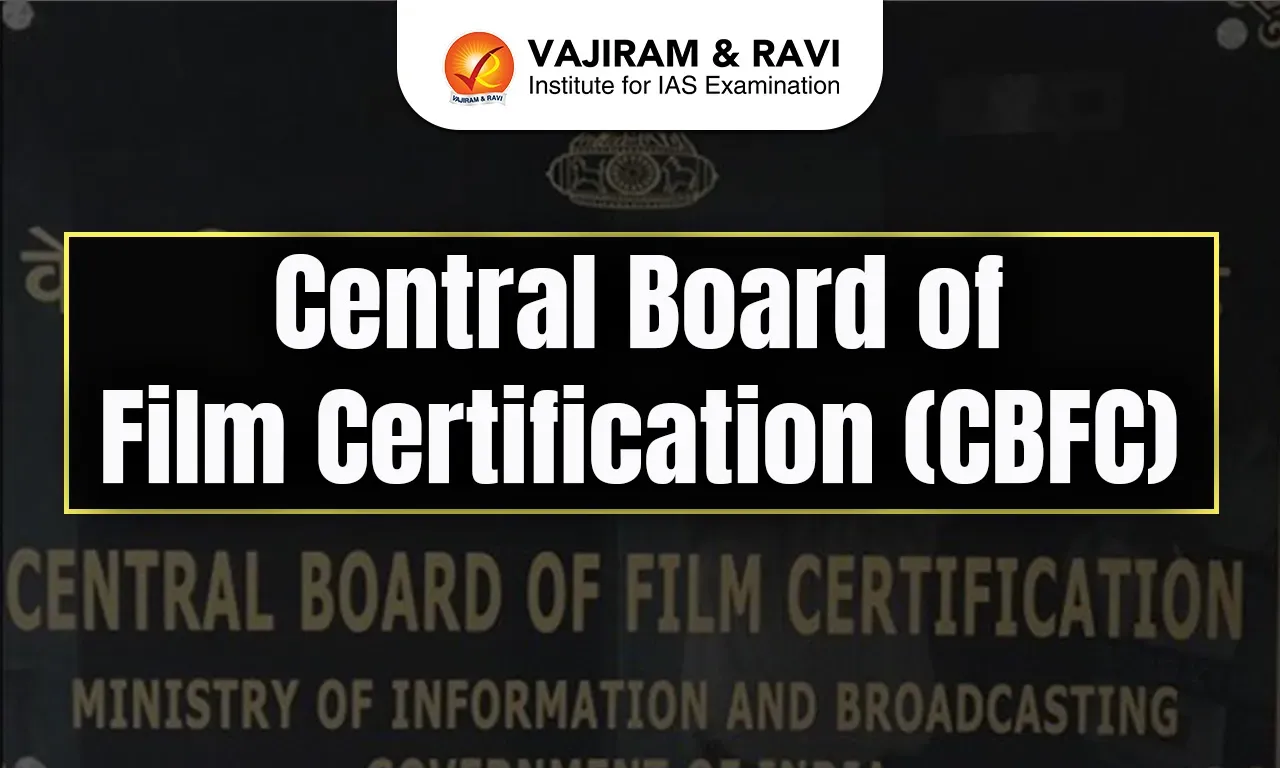Central Board of Film Certification (CBFC) Latest News
Recently, multiple films faced heavy censorship by the CBFC over caste, mythology, and political references.
About the Central Board of Film Certification (CBFC)
- The Central Board of Film Certification (CBFC) is a statutory body under the Ministry of Information and Broadcasting, Government of India.
- Commonly known as the Censor Board, though it functions mainly as a certification authority.
- It works under:
- Cinematograph Act, 1952
- Cinematograph (Certification) Rules, 1983
- Guidelines issued by the Central Government
Role and Structure of CBFC
- It regulates the public exhibition of films in India. No film can be released publicly without CBFC certification.
- Headed by a Chairperson, with 12–25 members appointed by the Central Government.
- It operates through nine regional offices: Mumbai, Kolkata, Chennai, Bangalore, Thiruvananthapuram, Hyderabad, New Delhi, Cuttack, and Guwahati.
- Supported by Advisory Panels (nominated by the Government for two-year terms) to assist in film examination.
Categories of Certification
- U (Universal): Suitable for all age groups.
- U/A: Universal with parental guidance (below 12).
- A: Adults only.
- S: Restricted to special classes (e.g., doctors, farmers).
- New Sub-Categories (2023 Amendment): UA 7+, UA 13+, UA 16+ – aligning with global best practices.
Source: IE
Last updated on December, 2025
→ Check out the latest UPSC Syllabus 2026 here.
→ Join Vajiram & Ravi’s Interview Guidance Programme for expert help to crack your final UPSC stage.
→ UPSC Mains Result 2025 is now out.
→ UPSC Notification 2026 is scheduled to be released on January 14, 2026.
→ UPSC Calendar 2026 is released on 15th May, 2025.
→ The UPSC Vacancy 2025 were released 1129, out of which 979 were for UPSC CSE and remaining 150 are for UPSC IFoS.
→ UPSC Prelims 2026 will be conducted on 24th May, 2026 & UPSC Mains 2026 will be conducted on 21st August 2026.
→ The UPSC Selection Process is of 3 stages-Prelims, Mains and Interview.
→ UPSC Result 2024 is released with latest UPSC Marksheet 2024. Check Now!
→ UPSC Prelims Result 2025 is out now for the CSE held on 25 May 2025.
→ UPSC Toppers List 2024 is released now. Shakti Dubey is UPSC AIR 1 2024 Topper.
→ UPSC Prelims Question Paper 2025 and Unofficial Prelims Answer Key 2025 are available now.
→ UPSC Mains Question Paper 2025 is out for Essay, GS 1, 2, 3 & GS 4.
→ UPSC Mains Indian Language Question Paper 2025 is now out.
→ UPSC Mains Optional Question Paper 2025 is now out.
→ Also check Best IAS Coaching in Delhi
Central Board of Film Certification (CBFC) FAQs
Q1. What is CBFC’s primary mandate?+
Q2. Can the CBFC ban a film?+
Q3. Why is CBFC often criticized?+
Tags: Central Board of Film Certification (CBFC) prelims pointers upsc prelims current affairs

















